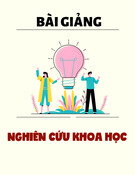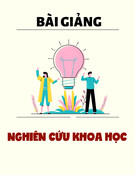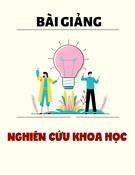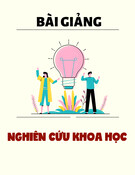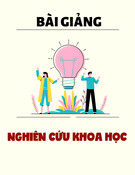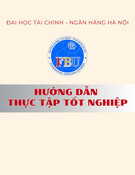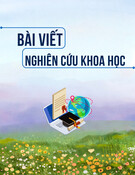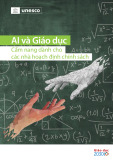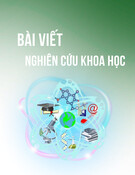
© 2019 JETIR February 2019, Volume 6, Issue 2 www.jetir.org (ISSN-2349-5162)
JETIR1902925
Journal of Emerging Technologies and Innovative Research (JETIR) www.jetir.org
194
IMPROVING SCIENCE LEARNING THROUGH
EXPERIENTIAL HANDS ON ACTIVITIES
Dr. Raj Lakshmi Raina
Assistant Professor
Amity Institute of Behavioural and Allied Sciences,
Noida, India
ABSTRACT The purpose of this study was to compare the effects of experiential science lessons in
improving science learning at primary level. The investigator used classroom exams and written
Reflections to assess the effects of the activities. Pre-test post test design was adopted. The results revealed
that there was significant difference in the scholastic achievement of the students and significant effects on
student knowledge gain.
Key words: Science education, experiential education
INRODUCTION:
The purpose of this Research was to find out the improvement in science learning through experiential
hands on activities. The research was conducted on the sample of 49 pupils of grade 5th of District Gautam
Buddha Nagar.
In order to teach any subject effectively, one must engage with the students and support them throughout the
learning process. This is especially true in science. By making them question themselves and their
preconceptions, they become more deeply engaged with the materials, and develop a better understanding of
the concepts and, as a result, gain a deeper sense of achievement than if they were to simply read the texts
and recite the facts.
Quite often classes are taught in a lecture style which tends to promote more of a fact-based or
memorization style of learning. This can be a problem for science, in particular, because of students, often
strongly developed, naive scientific preconceptions. In order to help reveal these misconceptions to both the
teacher and the student, a more dynamic inquiry-based teaching approach is recommended.
In an inquiry-based classroom environment the student takes the lead by performing hands-on activities that
the teacher has set up, asking questions and forming hypotheses about the tasks, collaborating with other
students and comparing ideas, and testing and reforming their hypotheses if results are contradictory to their
predictions.
Experiential learning (EL) is associated with “learning by doing” but it generally goes beyond this. EL is
best understood as learning through reflection on doing.
The purpose of education is to develop children and youth holistically. National Curriculum Framework
(NCF 2005) focus on experiential learning and constructivist pedagogy and RTE 2009 focusing on
learning through doing discovery and exploration, focusing on primacy of children engagement through
appropriate activities and work for meaningful learning. The children performance in terms of learning
outcomes mostly depends upon quality of teacher and teaching. The pedagogical approaches and learning
climate have significant impact on what children learn in terms of knowledge, skills and attitudes. Group
activity, discussions with peers and teachers, surveys, organisation of data and their display through
exhibitions, etc. in schools and neighbourhood are to be an important component of pedagogy. As a result,

© 2019 JETIR February 2019, Volume 6, Issue 2 www.jetir.org (ISSN-2349-5162)
JETIR1902925
Journal of Emerging Technologies and Innovative Research (JETIR) www.jetir.org
195
the researcher was drawn to carry out this study to explore the Improvement in science learning through
experiential hands on activities
The main research question governing this research was as follows:
Is there improvement in science learning through experiential hands on activities?
REVIEW OF RELATED LITERATURE
Hendry and Warkentin (1996), Vinod (2010), Thompson (2008), conducted study on the Impact of
Experiential learning environment on students they concluded that there was positive impact of an
experiential learning curriculum for secondary students. According to the studies this method helped in
attainment of objectives, and also catered to the overall development of the personality. The studies
conclude that Experiential learning, enables learning methods to fit each person’s own preferred learning
styles and natural preferences, because learners are encouraged and helped to learn and develop in their
own ways using strategies which they find most comfortable and confident Jaques, Gibbs and Rust,
(1993).
In a study by Lin and Schunn (2016) the only learning experience in a comparison of traditional, non-
formal and informal experiences to have an effect on science interest and values was experiences of
informal science at home.
In addition to the challenge faced by teachers in ensuring proper understanding among students, many
research studies have also highlighted the necessity for teachers who are teaching Science to primary school
students through hands-on experiments to possess specific and adequate training (Allen, 1973; Klahr et al.,
1999).
OBJECTIVES OF THE STUDY
To improve science learning through experiential hands on activities.
To study the Effect of experiential learning of science on the scholastic achievement of the students
of District Gautam Buddha Nagar.
To create the interest in learning science.
To create learning opportunities for students.
HYPOTHESIS
There is a significant improvement in science learning through experiential hands on
activities.
RESEARCH DESIGN AND METHODOLOGY
Research Design –The study adopted “pre-test and post-test design”
Universe of the Study – It consisted of all the students of 5th standard of Greater Noida.
Sampling Frame - The sample of 49 students was selected through Purposive sampling technique from
class 5th in Greater Noida, UP.

© 2019 JETIR February 2019, Volume 6, Issue 2 www.jetir.org (ISSN-2349-5162)
JETIR1902925
Journal of Emerging Technologies and Innovative Research (JETIR) www.jetir.org
196
Methodology
The study adopted “pre-test and post-test design” to find the significant improvement in science learning
through experiential hands on activities. In this study the researcher planed the hands on activities for class
V. Thus the classroom observation, the feedback of the students and the results of the pre-test and post test
were utilized to investigate weather students learnt better through experiential learning approach. Further the
data was also used to explore weather the approach had any impact on the development of students interest
enjoyment and self motivation.
Tools
1. Achievement test developed by the researcher to investigate the skills acquired.
2. Self developed Questionnaire for students and teachers
Statistical Analysis
T-test &graphical analysis was done to analyse the data obtained.
INTERPRETATION OF DATA
Following the above mentioned undertaken activities inferences were drawn and overall evaluation of
the project was done.
Effect of Experiential learning on the student’s academic achievement
Keeping the objective of the research in mind the hypothesis was to find if there was a significant impact
on the academic achievement of the students after experiential learning. The pretest and post test of the
students was conducted and the raw score obtained was statistically analyzed.
Table 1
Significance of difference between Mean of achievement test of the students
Academic
Achievement
N
Mean
SD
t-value
Level of
Significance
Pre Test
49
12.02
2.3
1.66
**
Post Test
49
14.62
3.8
** Significant at .01 level
Table 1 revealed that the mean scores of the achievement test of the students before and after the
experiential learning is 12.02 and 14.62 respectively and their standard deviation is 2.3 and 3.8 respectively.
The t-ratio was calculated as 1.66 which is significant at 0.01 level of confidence. Therefore the hypothesis

© 2019 JETIR February 2019, Volume 6, Issue 2 www.jetir.org (ISSN-2349-5162)
JETIR1902925
Journal of Emerging Technologies and Innovative Research (JETIR) www.jetir.org
197
that there was a significant impact on the academic achievement of the students after experiential learning
was accepted.
Overall the forty nine students in class 5th have shown a slight improvement based on the pretest before the
implementation of experiential learning and post test after the implementation of experiential learning.
Fig 1 Graphical representation of pre test and post test in science
Impact of Experiential learning on the student’s interest in learning science.
After the completion of the modules a feedback form was given to the students regarding the above
mentioned undertaken activities; the students offered a positive feed-back to the experiential situations they
participated in, showing great interest throughout the activities carried out and being actively involved in the
proposed l activities.
Students were asked several questions related to their willingness to participate in the experiences proposed
during the organized activities. Figure 1 is the result of their feed-back
Table 2
like
Do not
like
a
Are you ready to perform scientific experiments
43
7
b
Are you interested on making research?
28
22
0
2
4
6
8
10
12
14
16
Mean SD
Pre Test in Science
Post Test in Science

© 2019 JETIR February 2019, Volume 6, Issue 2 www.jetir.org (ISSN-2349-5162)
JETIR1902925
Journal of Emerging Technologies and Innovative Research (JETIR) www.jetir.org
198
c
Are you interested on participating in scientific studies?
43
7
d
Are you interested in performing experiments in a scientific
laboratory?
38
12
e
Do you read books and scientific journals?
39
11
f
Do you use scientific concepts (learnt in school) for scientific
purposes?
36
14
g
Is Science helpful in the future?
47
3
h
Do you like science?
40
10
i
Are you interested in science?
41
9
j
Do you enjoy science Lessons?
42
8
k
Do you like to actively participate in science class?
35
15
l
Do you like to do extra reading in science?
41
9
m
Are you interested in performing experiments at home?
37
13

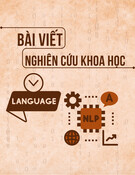
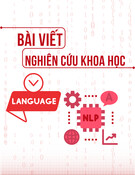
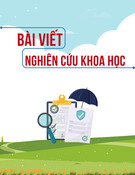
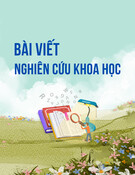
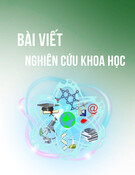

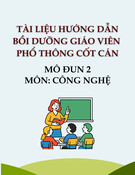
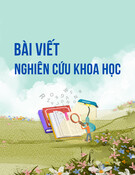
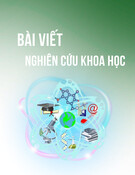

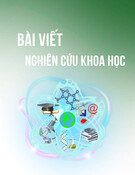
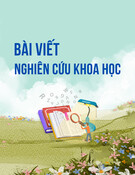
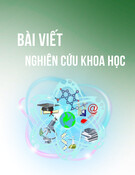
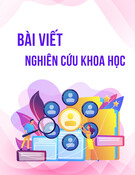
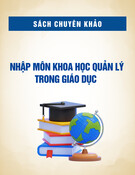
![Định hướng giáo dục STEM trong trường trung học: Tài liệu [chuẩn/mới nhất]](https://cdn.tailieu.vn/images/document/thumbnail/2025/20251124/dbui65015@gmail.com/135x160/25561764038505.jpg)
